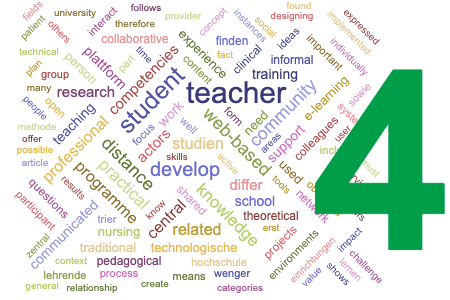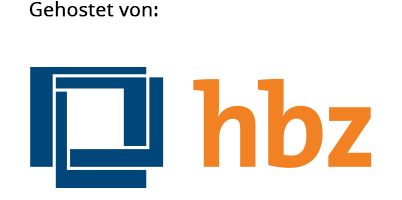4. Issue July 2008

- Summary
- Issue 4 begins with an article on teachers who are involved in web-based learning applications in schools and who form a community of practice. Another article presents a comparative study of two traditional nursing schools and a distance learning program. The third article investigates infrastructural and strategic issues related to the organizational embodiment and sustainably effective use of learning management systems in universities.
- Zusammenfassung
- Ausgabe 4 beginnt mit einem Beitrag über das Verhalten von Lehrern, die in Web-basierte Lernanwendungen an Schulen eingebunden sind, und die eine Community of Practice bilden. Es folgt eine vergleichende Studie an zwei traditionellen Krankenpflege-Schulen sowie einem Fernlehr-Programm. Der letzte Beitrag behandelt Strategien für die organisatorische Verankerung von Evaluations- und Re-Evaluationsprozessen an der Universität Trier.
Editorial
Recently, in a project review meeting I heard a reviewer saying: “e-learning is no research topic anymore. We should not fund the e-learning component of this project.” I was puzzled. Maybe he was right – at least if we reduce the concept e-learning to the provision of digital learning content and digital technologies supporting the learning processes. Online learning (Anderson & Elloumi, 2004) has entered the mainstream (The Sloan Consortium, 2004). The e-learning industry expands continuously, competing with well-received educational open source products. Lots of learning management platforms have been built and used; e-learning scenarios and software tools supporting content authoring, learning path and activity design, communication, collaboration and group work, testing and assessment, portfolio management, and other e-educational activities became commodities; these developments are backed up by e-learning standards aiming at the interoperability of tools and applications, the portability of content and educational scenarios from platform to platform, and the compatibility of cross-system and cross-institution workflows. Many (higher) educational institutions have already defined their strategy and implementation plan for developing and embedding e-learning or are already using it in their daily practice.
If this were the end of the story, we could close our journal or – at least - the scientific paper section. But luckily there is a growing awareness among researchers, practitioners and organisations that a mere technology-focussed approach does not guarantee better teaching and learning experiences. Education theorists like Benjamin Bloom, Burrhus F. Skinner, and many others devoted much of their life to understand the possibilities and psychology of education, human behaviour and the growth of knowledge. As they lived at a different time and as I believe that opportunities create new intentions and actions, some of their findings need to be and are reconsidered in the context of e-learning.
The whole field of educational technology aims to transform educational and psychological theories into meaningful pedagogical practices. It also tries to provide qualitative and quantitative evidence that the use of digital technology and novel pedagogical approaches like web pedagogy, online learning, or personalised and adaptive learning affects educational processes positively. My impression is education technologists are highly sought and are facing challenges that provide plenty of work for the future. Technology-wise usability is far from perfect, and ongoing developments in the Internet like Web 2.0 and higher are creating further changes. Large deficits still exist in our understanding of knowledge and experience sharing processes and mechanisms and the role of web communities in educational contexts.
So we can be in good hope for future high quality submissions addressing, e.g., technological novelties, innovative educational scenarios, or commoditised content production methods, always in combination with evidence demonstrating a pedagogical or otherwise manifested added value.
The articles of this issue support these observations. But before I briefly get to the scientific contributions of this issue, I wanted to respond to a question, we are frequently asked: „Is it possible to edit a special issue with scientific papers on a particular topic?“ Our answer is: Yes! Propose a topic, describe how you plan to acquire and select high quality contributions, and suggest a tentative publication date. We will discuss your suggestion with the editorial board members and give you a qualified feedback.
The paper by Ryymin, Lallimo and Hakkarainen presents the findings of empirical research work that tried to understand the behaviour of teachers who are involved in web-based learning applications in schools and who form a community of practice whose aim is to share professional experience and evolve its members’ proficiency in that field. Social network analysis, interviews and phenomenographic methods were used as tools in this research, where the latter is a qualitative approach to determine how individuals constitute the meaning of a phenomenon. Both the combination of research methods applied and the findings, which have a potential to carry over to other communities of practice, make the paper valuable to read.
Starting point of the paper by Fredskild are the potential deficits of the distance teaching model in nursing education in which the interaction between peer and apprentice is a basic mechanism of the learning process, especially during clinical training. The author presents the results of a comparative study of two traditional nursing schools and a distance learning programme. The study examines differences and similarities in skills and competences acquired, differences between the programmes, and differences in types of students attracted. In conclusion the authors suggests some guidelines to the teaching design in distance programmes.
The third article (in German) by Jäckel, Leuenhagen and Röpke addresses infrastructural and strategic issues related to the organisational embodiment and sustainably effective use of learning management systems in universities. The stepwise process adopted by the University of Trier with the components: organisational structure, LMS evaluation, selection criteria, recommendation, and regular re-evaluation are presented in detail together with a range of lessons learned.
Bernd Krämer


